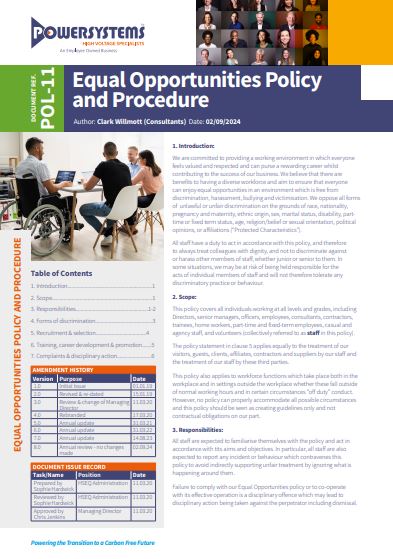Speak to Powersystems today
You can contact us as follows
We are committed to providing a working environment in which everyone feels valued and respected and can pursue a rewarding career whilst contributing to the success of our business.
We believe that there are benefits to having a diverse workforce and aim to ensure that everyone can enjoy equal opportunities in an environment which is free from discrimination, harassment, bullying and victimisation.

Introduction
We are committed to providing a working environment in which everyone feels valued and respected and can pursue a rewarding career whilst contributing to the success of our business. We believe that there are benefits to having a diverse workforce and aim to ensure that everyone can enjoy equal opportunities in an environment which is free from discrimination, harassment, bullying and victimisation. We oppose all forms of unlawful or unfair discrimination on the grounds of race, nationality, pregnancy and maternity, ethnic origin, sex, marital status, disability, part-time or fixed term status, age, religion/belief or sexual orientation, political opinions, or affiliations (“Protected Characteristics”).
All staff have a duty to act in accordance with this policy, and therefore to always treat colleagues with dignity, and not to discriminate against or harass other members of staff, whether junior or senior to them. In some situations, we may be at risk of being held responsible for the acts of individual members of staff and will not therefore tolerate any discriminatory practice or behaviour.
3. Responsibilities:
All staff are expected to familiarise themselves with the policy and act in accordance with its aims and objectives. In particular, all staff are also expected to report any incident or behaviour which contravenes this policy to avoid indirectly supporting unfair treatment by ignoring what is happening around them. Failure to comply with our Equal Opportunities policy or to co-operate with its effective operation is a disciplinary offence which may lead to disciplinary action being taken against the perpetrator including dismissal
4. Forms of Discrimination:
Discrimination may be direct or indirect and it may occur intentionally or unintentionally.
Direct discrimination occurs where someone is put at a disadvantage for a reason related to one or more of the grounds set out. For example, rejecting an applicant on the grounds of their race because it is considered they would not ‘fit in’ could be direct discrimination.
Indirect discrimination occurs where an individual is subject to an unjustified provision, criterion or practice which puts them at a particular disadvantage because of one of the grounds set out. For example, a height requirement would be likely to eliminate proportionately more women than men. Using this example, if these criteria cannot be objectively justified for a reason unconnected with sex, it would be indirectly discriminatory on the grounds of sex.
Discrimination also includes victimisation which is where someone is treated less favourably than their colleagues because they have complained about discrimination, or they have helped a colleague with their complaint about discrimination and harassment which is detailed in our Anti-Bullying and Harassment Policy.
5.Recruitment and Selection:
No vacancy should be advertised or publicised in a way which discourages viable applications from any sector of the population.
All applicants should be considered on merit. Everyone should be assessed so far as practicable against a set of non-discriminatory criteria which should be directly related to the demands of the vacancy.
If there is a genuine and lawful reason for limiting the vacancy to a particular group, this should be clearly stated, together with the grounds for it, on any advertisements. We retain the discretion to invite applications from individuals whose jobs might be at risk of redundancy, or who are being re-deployed for health or disability reasons, before advertising any post more widely.
6. Training, career development and promotion:
All staff should be provided with the appropriate training (according to business need) to enable them to improve their performance and to achieve the performance standards and targets set for them by us, regardless of any of the Protected Characteristics listed in clause 1.
We should also ensure that opportunities for training, career development are based on personal merit and made equally available to all employees.
Promotion is based on personal merit and the reasonable requirements of the job regardless of their Protected Characteristic.
7. Complaints and disciplinary action:
If you believe that you have been harassed, victimised, or discriminated against, you are encouraged to raise the matter through the reporting procedure laid out in our Anti-Bullying and Harassment Policy.
Every complaint should be investigated and dealt with sympathetically and without bias and as quickly as is practicable. We recognise that some staff members may prefer not to have their names used in any investigation and/or disciplinary hearing. We should seek to accommodate such requests as far as practicable, but staff will appreciate that if we are unable to mention names this may limit our ability to investigate the complaint. This in turn may limit the extent to which we can pursue the complaint and/or act against the perpetrator. Please note, that if you raise a grievance about the behaviour of another member of staff which we consider to be particularly serious, we reserve the right to continue to investigate and deal with your complaint, even if you decide against pursuing it.
Every effort will be made to ensure that individuals who make a complaint in good faith will not suffer any further detriment or be victimised because of making such a complaint.
You can contact us as follows